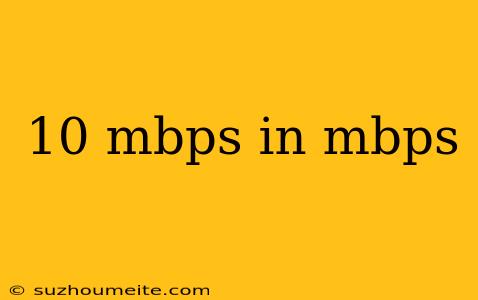10 Mbps in MBps: Understanding the Difference
When it comes to measuring internet speed, there are two common units of measurement: Mbps (megabits per second) and MBps (megabytes per second). While they may seem similar, they represent different quantities, and understanding the difference is essential to accurately assess your internet speed.
What is Mbps?
Mbps stands for megabits per second. It's a unit of measurement for digital information transfer rates, particularly for internet bandwidth and network throughput. Mbps measures the number of bits (0s and 1s) transmitted per second. In the context of internet speed, Mbps represents the rate at which data is downloaded or uploaded.
For example, an internet plan with a speed of 10 Mbps means you can download data at a rate of 10 million bits per second.
What is MBps?
MBps stands for megabytes per second. It's a unit of measurement for digital information storage capacity, particularly for file sizes and data transfer rates. MBps measures the number of bytes (groups of 8 bits) transmitted per second. In the context of file transfers, MBps represents the rate at which files are downloaded or uploaded.
To put it simply, 1 MBps is equivalent to 8 Mbps, since there are 8 bits in a byte.
Converting 10 Mbps to MBps
Now, let's convert 10 Mbps to MBps. As mentioned earlier, 1 MBps is equivalent to 8 Mbps. To convert Mbps to MBps, we can divide by 8.
10 Mbps ÷ 8 = 1.25 MBps
So, 10 Mbps is equivalent to approximately 1.25 MBps.
Real-World Implications
Understanding the difference between Mbps and MBps is crucial when assessing your internet speed. For instance, if you have a 10 Mbps internet plan, you can expect to download files at a rate of approximately 1.25 MBps. This knowledge can help you:
- Choose the right internet plan for your needs
- Optimize your network for better performance
- Troubleshoot issues with your internet connection
In conclusion, while Mbps and MBps are related but distinct units of measurement, understanding the difference can help you make informed decisions about your internet speed and optimize your online experience.
